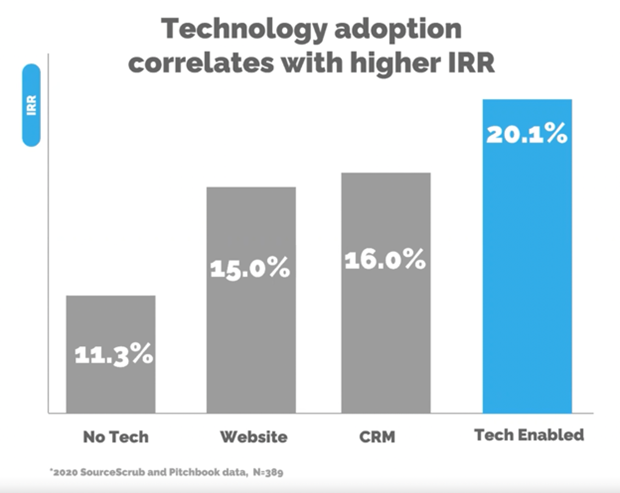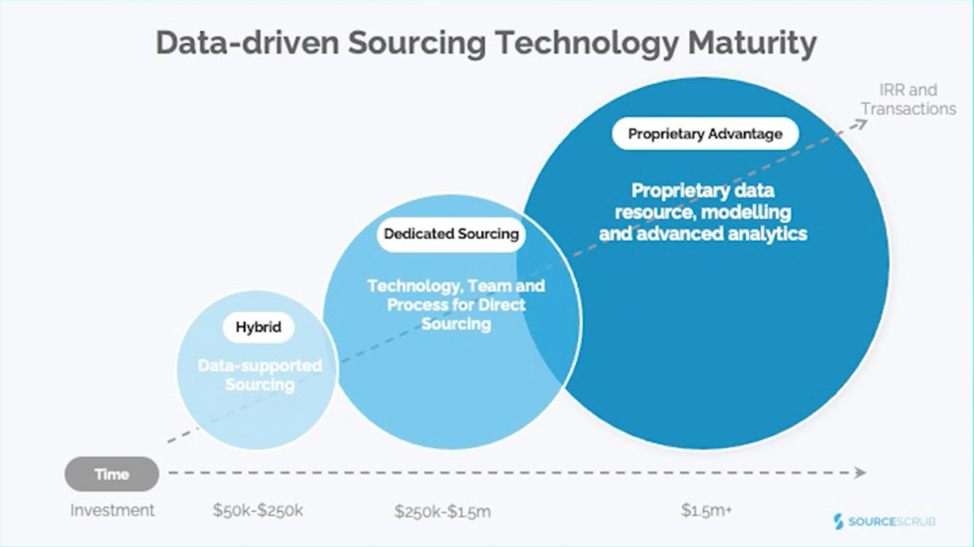
Private equity and investment banking firms are engaging in the fiercest competition in dealmaking history. The volume of capital ($3 trillion and counting) far outweighs the number of investment opportunities. Dealmakers are facing high prices and even higher multiples. And traditional relationship-driven sourcing tactics simply aren't as effective as they used to be.
Sourcescrub's Chief Operating Officer Frazier Miller recently spoke with the Association for Corporate Growth (ACG) to discuss how dealmakers can successfully adapt to this changing and highly competitive environment. During the back-to-back episodes of ACG's GrowthTV series, Frazier shared 3 specific ways that Sourcescrub customers are emerging at the head of the pack, and 3 common ways even the best firms can fall behind. Let's dig in!
"We hear from customers that their chances of winning deals go up exponentially when they're able to meet firms and targets earlier on in their lifecycles," reveals Frazier. This means firms can't wait for someone in their network to make an introduction. Finding and connecting with promising opportunities before competitors requires dealmakers to take a more proactive approach.
"A lot of firms are moving more to direct sourcing as opposed to relying on intermediated or sponsored deals," says Frazier. These firms usually form dedicated direct sourcing teams to identify and build relationships with founder-owned companies that match their investment criteria and show promising growth trajectories.
We recently did a study that directly correlated firms' use of technology to increased IRR. "Firms are using technology and data in new ways we haven't seen before," says Frazier. "They're using it to
identify these bootstrapped companies and which ones are going to be interesting to them, and also to reach out and execute a direct sourcing strategy."

Modern firms are embracing digital transformation and building robust technology stacks that empower them to do more with less. For example, rather than spend time digging up information about lesser-known bootstrapped companies, dealmakers can use private company intelligence platforms that automatically surface millions of relevant data signals about these businesses.
This free guide provides detailed, actionable advice on how leading dealmakers can build a competitive technology stack in record time!
Of course, simply collecting data isn't enough to succeed in today's highly competitive landscape. Top firms realize that they must use this data to generate unique strategies and insights to distinguish themselves from the crowd. As Frazier says, "A lot of the inspiration for these firms has been some of the high tech industries and firms that are using mass amounts of data, machine learning, and AI to be able to drive algorithmic models."
For example, one leading PE group was able to increase its deal volume by 3x by integrating Sourcescrub's full private company dataset with information from key internal sources in its data warehouse. The team now runs complex analyses and develops custom models to surface previously hidden opportunities that match portfolio companies' unique corporate development criteria.
"Adopting technology and data and using it wisely is no easy undertaking, and there are a lot of landmines along the way," admits Frazier. "Set expectations and know that it's a journey and you're going to stub your toe." Using a maturity model like the one below helps keeps firm on track and moving forward without putting undo pressure on teams.

The first stage of this journey is taking a hybrid approach where direct sourcing and technology are slowly incorporated into people's existing workflows and jobs. The second stage is to develop a full-fledged direct sourcing function with dedicated processes, technologies, and team members. Finally, the most mature dealmakers hire data scientists, purchase data lakes and warehouses, and integrate data across multiple sources to create proprietary advantage.
As you may notice at the bottom of the above maturity model, the more digitally mature a firm becomes, the more they should expect to invest in technology. The average US company's digital transformation budget is about $14 million, with global digital transformation spending expected to hit nearly $2 trillion in 2022.
"Funding is really important. You really need to make it part of the budgeting process," advises Frazier. "When they're initially establishing a fund, we see a lot of firms make technology and data investments part of the fund expense, as opposed to an operating expense," he suggests.
Keeping up with evolving market requirements and making data and technology a core part of your organization requires a deep cultural shift. Everyone needs to be on board and moving in unison toward
the same goals. "You really need commitment from the top," says Frazier. "This can't be a bottoms-up approach. It needs the MDs or partners to really buy into the notion that data and technology can really change their business."
Last but not least, while not everyone needs to be a direct sourcing expert or have undergone digital transformation at a prior company, it is important to bring some of these more experienced folks on board to help. "Make sure to hire good people who ideally have been through the journey before and can point out where some of the landmines are," Frazier says.
Sourcescrub works with dozens of today's leading private equity, investment banking, and M&A firms. In addition to fueling their direct sourcing approach, our private company intelligence platform is also a key piece of their digital transformations and proprietary data models. That means we have a lot more competitive tips to share!
You can watch Frazier's full interviews with GrowthTV here: